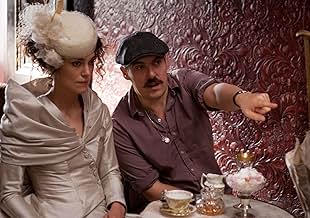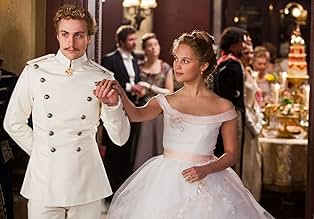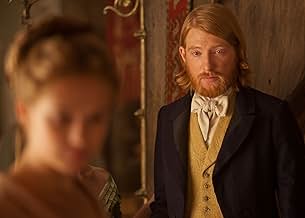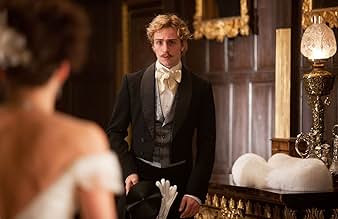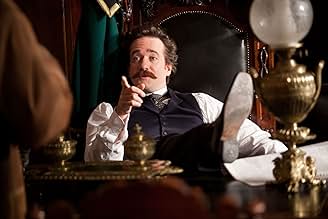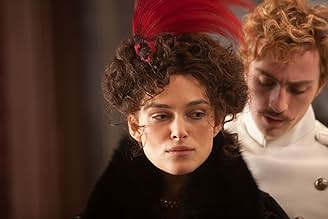In late-19th-century Russian high society, St. Petersburg aristocrat Anna Karenina enters into a life-changing affair with the dashing Count Alexei Vronsky.In late-19th-century Russian high society, St. Petersburg aristocrat Anna Karenina enters into a life-changing affair with the dashing Count Alexei Vronsky.In late-19th-century Russian high society, St. Petersburg aristocrat Anna Karenina enters into a life-changing affair with the dashing Count Alexei Vronsky.
- Won 1 Oscar
- 33 wins & 54 nominations total
- Director
- Writers
- All cast & crew
- Production, box office & more at IMDbPro
Featured reviews
If your prime reaction to a film is one of disappointment there are usually some good reasons. My principal response to this version of a great and well-known story is one of irritation. The overblown theatrical format of the film gets in the way of character and dramatic development, to the point where you're aware of a director proclaiming "aren't we clever with the way we're staging this?" instead of admiring the straightforward and competent telling of a story. I'm not saying all films have to be constructed in a conventional manner, but when the form overtakes the substance something has gone wrong.
Aaron Taylor-Johnson as Count Vronsky is a piece of serious miscasting. Instead of looking like a great lover and sure temptation for wavering Anna,he looks like some feeble dandy with his foppish shock of dyed curly blonde hair which makes him look quite ridiculous. How on earth Anna could fall for such a creepy-looking guy is beyond most viewers I would submit.
Keira Knightley does the best she can, despite looking most of the time like she's attending a fashion shoot. The character of Anna requires portrayal of a tragic life which she doesn't quite achieve. However, the whole film fails to convey the grandeur of Tolstoy's vision, so she's let off the hook by the film's general levity and lack of substance.
Aaron Taylor-Johnson as Count Vronsky is a piece of serious miscasting. Instead of looking like a great lover and sure temptation for wavering Anna,he looks like some feeble dandy with his foppish shock of dyed curly blonde hair which makes him look quite ridiculous. How on earth Anna could fall for such a creepy-looking guy is beyond most viewers I would submit.
Keira Knightley does the best she can, despite looking most of the time like she's attending a fashion shoot. The character of Anna requires portrayal of a tragic life which she doesn't quite achieve. However, the whole film fails to convey the grandeur of Tolstoy's vision, so she's let off the hook by the film's general levity and lack of substance.
I once asked Dustin Hoffman if he had any favorite movies or actors. He replied that he had favorite performances. Referring it seemed, to much smaller periods within a film. There are several shots where Keira is picture perfect, but this role was not for her. This performance ruins our memory of her former success under Joe Wright. Especially her first, which is her most unforgettable. Black Swan did the same for Natalie Portman, another of our cinema sweethearts. Which I walked out of.
Her part here needed to be much deeper and more complex, but instead it was shallow and trite. The way Anna was portrayed was out of place. Whether by acting or writing I don't know. Either way it was a mistake. All of the male leads, four at my count, complemented each other perfectly and were well done. Some surprising cameos among the women.
I didn't see it at the theater after hearing about the stage within the movie technique, which has actually been done in a few good movies. I didn't see it as a problem. The recent film Anonymous about Shakespeare began this way, as do others based on plays of his. Julie Taymore in her solo attempt to put Titus on film blended styles while injecting modern means and mechanism into near ancient settings, and pulled it off very smartly. Both of these were good films and highly worth watching. I point this out as there were many complaints about it in other reviews.
It isn't the blending of the modern and the ancient, or the use of multiple styles in itself that is a problem. It's more a question of whether it works, and how well it was done. I believe here it does. Peter Greenaway excels at this kind of film making. We sometimes forget how shallow we have become as a society. What a melange and patchwork our culture is. Are we surprised it shows up in our films.
There are some moments of clarity in the movie that are almost bewitching. While others present motion picture as painting or poetry. Some very good transitions. Overall I believe it to be a very creative effort. It is a blending of choreography, stage, and cinema with a desire to please the eye and entertain our emotions. It was only the moral ambiguity and modern sensibilities between the two lovers I found contemptible. Both of them being out of time and out of place.
Love is the great conquerer of lust. As lust is the great destroyer of love. I believe the author intended this to be about the second. It is a mistake to think movies from books should be the book. Just as it is wrong for an amoral people to replace the beliefs of a moral people . . with their own. Especially when borrowing or telling their stories. One of the great enjoyments for all lovers of period pieces is going back to a time when people knew morality and understood what it was, and most agreed with it. Whether or not they actually were moral is entirely . . another story.
http://fullgrownministry.wordpress.com/2013/08/04/covet/
Her part here needed to be much deeper and more complex, but instead it was shallow and trite. The way Anna was portrayed was out of place. Whether by acting or writing I don't know. Either way it was a mistake. All of the male leads, four at my count, complemented each other perfectly and were well done. Some surprising cameos among the women.
I didn't see it at the theater after hearing about the stage within the movie technique, which has actually been done in a few good movies. I didn't see it as a problem. The recent film Anonymous about Shakespeare began this way, as do others based on plays of his. Julie Taymore in her solo attempt to put Titus on film blended styles while injecting modern means and mechanism into near ancient settings, and pulled it off very smartly. Both of these were good films and highly worth watching. I point this out as there were many complaints about it in other reviews.
It isn't the blending of the modern and the ancient, or the use of multiple styles in itself that is a problem. It's more a question of whether it works, and how well it was done. I believe here it does. Peter Greenaway excels at this kind of film making. We sometimes forget how shallow we have become as a society. What a melange and patchwork our culture is. Are we surprised it shows up in our films.
There are some moments of clarity in the movie that are almost bewitching. While others present motion picture as painting or poetry. Some very good transitions. Overall I believe it to be a very creative effort. It is a blending of choreography, stage, and cinema with a desire to please the eye and entertain our emotions. It was only the moral ambiguity and modern sensibilities between the two lovers I found contemptible. Both of them being out of time and out of place.
Love is the great conquerer of lust. As lust is the great destroyer of love. I believe the author intended this to be about the second. It is a mistake to think movies from books should be the book. Just as it is wrong for an amoral people to replace the beliefs of a moral people . . with their own. Especially when borrowing or telling their stories. One of the great enjoyments for all lovers of period pieces is going back to a time when people knew morality and understood what it was, and most agreed with it. Whether or not they actually were moral is entirely . . another story.
http://fullgrownministry.wordpress.com/2013/08/04/covet/
I adore the novel, so I will be discussing Joe Wright's take on it and where it ranks amongst other adaptations but I will of course look at its merits as a film aside from the novel.
As a whole adaptation, this version falls somewhere in the middle. Even without all the metatheatrical trappings, it still took an interesting and valid approach to the novel, proving that the novel could be adapted until infinity and it would still be fresh each time. As readers of the novel would know, there is much more to it than Anna's affair. Tolstoy did not write vague types: he wrote fully-fleshed characters, and Tom Stoppard's screenplay acknowledged Tolstoy's style. Therefore I don't want to condemn the film outright because that would overshadow the things that it does get right.
Keira Knightley's version of Anna is not nearly as bad as you would think. She has the sense to restrain herself a little so that the many other elements of the novel shine through. She goes for the unsympathetic approach and it works. All her mannerisms that I generally find annoying- the schoolgirl smirking and rampant nymphomania- actually work for this role. This Anna takes Vronsky just because she can, and then ultimately regrets it. We can feel her frustration: she's young and wants to have fun but she's tied down to a stuffy older husband. In that sense, it's quite a modern interpretation, but not hideously so.
Aaron Taylor-Johnson as Count Vronsky was just miscast. If the novel had been about Anna seducing a schoolboy, he would have been great, but Vronsky is meant to be a dashing man. The styling is atrocious- he looks like a seventies Scandinavian Eurovision entry. Wright seems to have told some of the actors to act realistic and some to play up to the stylised setting. Taylor-Johnson plays the artifice so much that he just comes off as camp and sleazy. The scene where he is about to ride Frou Frou is like a production of Equus and there's a love scene with Keira Knightley that brought to mind an old advert for Philadelphia cheese. Their revelation of love is also poorly dealt with. Anna has some kind of fantasy dream where the two have an "erotic ballet" and suddenly they're banging away, presumably now in the real world.
Jude Law as Karenin. A bizarre choice when he could have played Vronsky five years ago and might even get away with it now at a push. However, he gives a performance that is probably his best. His Karenin is a bureaucrat through and through. Other adaptations have still made Karenin an attractive option. This Karenin is certainly not going to develop any great passion soon. We also see how he is manipulated by moral guardian Countess Lydia. If Law is trying to make a reputation as a serious actor, he's on the right path.
And what about all that pretentious theatre stuff? It seriously slows down the pace in the first third but once you get used to it, you can just enjoy the film. The ending is rather abrupt (no, that famous ending is not the last scene) but quite poignant.
As a whole adaptation, this version falls somewhere in the middle. Even without all the metatheatrical trappings, it still took an interesting and valid approach to the novel, proving that the novel could be adapted until infinity and it would still be fresh each time. As readers of the novel would know, there is much more to it than Anna's affair. Tolstoy did not write vague types: he wrote fully-fleshed characters, and Tom Stoppard's screenplay acknowledged Tolstoy's style. Therefore I don't want to condemn the film outright because that would overshadow the things that it does get right.
Keira Knightley's version of Anna is not nearly as bad as you would think. She has the sense to restrain herself a little so that the many other elements of the novel shine through. She goes for the unsympathetic approach and it works. All her mannerisms that I generally find annoying- the schoolgirl smirking and rampant nymphomania- actually work for this role. This Anna takes Vronsky just because she can, and then ultimately regrets it. We can feel her frustration: she's young and wants to have fun but she's tied down to a stuffy older husband. In that sense, it's quite a modern interpretation, but not hideously so.
Aaron Taylor-Johnson as Count Vronsky was just miscast. If the novel had been about Anna seducing a schoolboy, he would have been great, but Vronsky is meant to be a dashing man. The styling is atrocious- he looks like a seventies Scandinavian Eurovision entry. Wright seems to have told some of the actors to act realistic and some to play up to the stylised setting. Taylor-Johnson plays the artifice so much that he just comes off as camp and sleazy. The scene where he is about to ride Frou Frou is like a production of Equus and there's a love scene with Keira Knightley that brought to mind an old advert for Philadelphia cheese. Their revelation of love is also poorly dealt with. Anna has some kind of fantasy dream where the two have an "erotic ballet" and suddenly they're banging away, presumably now in the real world.
Jude Law as Karenin. A bizarre choice when he could have played Vronsky five years ago and might even get away with it now at a push. However, he gives a performance that is probably his best. His Karenin is a bureaucrat through and through. Other adaptations have still made Karenin an attractive option. This Karenin is certainly not going to develop any great passion soon. We also see how he is manipulated by moral guardian Countess Lydia. If Law is trying to make a reputation as a serious actor, he's on the right path.
And what about all that pretentious theatre stuff? It seriously slows down the pace in the first third but once you get used to it, you can just enjoy the film. The ending is rather abrupt (no, that famous ending is not the last scene) but quite poignant.
Good production but doesn't quite hit the spot.
Set in 19th century Russia, a married aristocrat, Anna Karenina (played by Keira Knightley), starts an affair with a Count. After a while, the relationship becomes quite serious...
A decent adaptation of the Tolstoy novel. Lavish costumes and sets, and a sense of the emptiness and superficiality of Russian aristocracy. However, for all its intrigues, just doesn't quite hit the spot. Not entirely engaging and seems to drag in segments. Some of the imagery was just to clever for its own good, ending up feeling pretentious.
Solid performances all round. Jude Law is the best of the lot, as the conservative husband of Anna Karenina.
Set in 19th century Russia, a married aristocrat, Anna Karenina (played by Keira Knightley), starts an affair with a Count. After a while, the relationship becomes quite serious...
A decent adaptation of the Tolstoy novel. Lavish costumes and sets, and a sense of the emptiness and superficiality of Russian aristocracy. However, for all its intrigues, just doesn't quite hit the spot. Not entirely engaging and seems to drag in segments. Some of the imagery was just to clever for its own good, ending up feeling pretentious.
Solid performances all round. Jude Law is the best of the lot, as the conservative husband of Anna Karenina.
This adaptation of Anna Karenina is a very flat adaptation of one of the greatest pieces of literature, but actually it is not only a failure as an adaptation but disappointing also on its own merits. It is not without its redeeming qualities of course, the costumes and sets are gorgeous and some of the best of the year, the music is beautifully composed, Jude Law is a superbly restrained and dignified Karenin and Matthew Macfadyen and Domhnall Gleeson are similarly excellent as Stiva and Levin respectively. Keira Knightley in the title role however didn't do it for me. She tries but comes across as too young and too selfish, and I also didn't care at all for her over-earnest mannerisms. The weak link of the cast is the woeful miscast that is Aaron Taylor-Johnson's Vronsky, often too moody and wooden as well as too effeminate and foppish, so much so it comes across as creepy. The script is very stilted and lacking in any kind of heart. There is a lot of melodrama as well but it comes across as forced, while the switching from play-within-a-play to film is confusing. The story similarly suffers from pedestrian pacing and the drama and characters are too thin to make us properly care and that is including Anna, whose attempts to overcome her suffering is entirely too trivialised here. Even bigger of a problem was Joe Wright's direction, I loved Pride and Prejudice and especially Atonement so I hoping a similar kind of directing job. But Wright often seems to be paying attention to himself too much, with the camera work too incongruous and surreal. Everything, from the gimmicky theatrical elements to the ball scene where the dancing is so robotic and where you don't have a clue what dance style it's supposed to be, plays too much of an overblown musical but without song and dance. In conclusion a disappointment even on its own, for me a beautiful bore is a very apt summing up as to how I felt about it. See the Greta Garbo and Vivien Leigh films instead. 4/10 Bethany Cox
Did you know
- TriviaOne of Alicia Vikander's favorite experiences from the production was the filming that took place in the countryside outside of St. Petersburg, Russia. The temperatures dropped below -40 °C, and she stayed in a cabin for five days that didn't have hot water and only featured benches instead of beds. Meanwhile, Russian security guards protected her and co-star 'Domhnall Gleeson' from wild wolves and bears that dominated the deserted area.
- GoofsThe label of the bottle of morphine Anna drinks from changes from "la Morphine" to "Morphine" between shots. The only correct French form would be without an article (prescriptions would have been written in Latin in 19th-century Russia anyway).
- ConnectionsFeatured in Projector: Anna Karenina (2012)
- SoundtracksSong for a New Life (Masha's Song)
(uncredited)
Written by Anoushka Shankar
Performed by Tannishtha Chatterjee
- How long is Anna Karenina?Powered by Alexa
Details
- Release date
- Countries of origin
- Official site
- Language
- Also known as
- Anna Karenina
- Filming locations
- Kizhi, Karelia, Russia(on location)
- Production companies
- See more company credits at IMDbPro
Box office
- Budget
- $40,600,000 (estimated)
- Gross US & Canada
- $12,816,367
- Opening weekend US & Canada
- $320,690
- Nov 18, 2012
- Gross worldwide
- $68,929,150
- Runtime2 hours 9 minutes
- Color
- Sound mix
- Aspect ratio
- 2.35 : 1
Contribute to this page
Suggest an edit or add missing content








